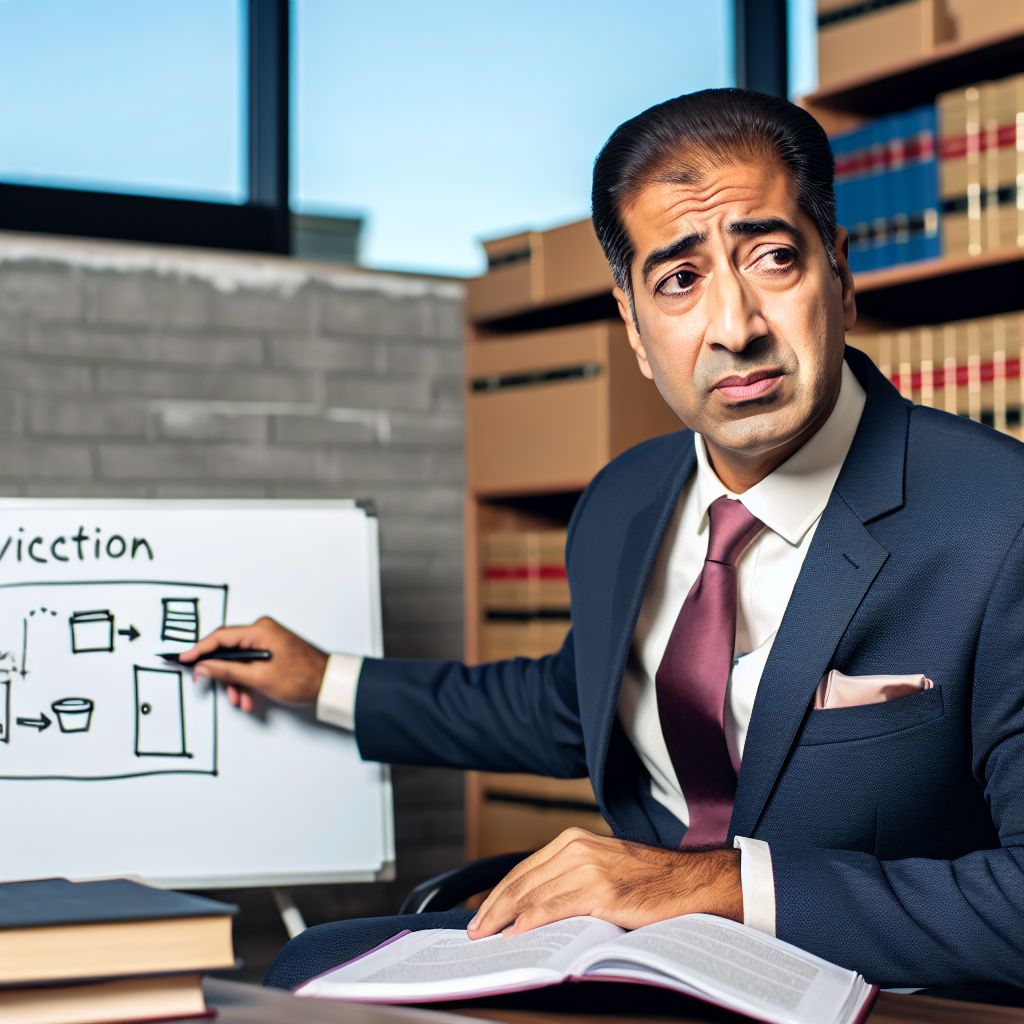Introduction to the Eviction Process for Commercial Tenants
Understanding the eviction process for commercial tenants is crucial for landlords and tenants alike.
This process involves legal procedures that ensure fairness and compliance with the law.
Initially, landlords must establish valid grounds for eviction.
Common reasons may include failure to pay rent or violation of lease terms.
Once grounds are established, landlords should notify tenants properly.
This notification typically comes in the form of a written notice.
Additionally, the notice must specify the reason for the eviction.
Furthermore, it should provide the tenant with a deadline to remedy the issue.
If the tenant fails to address the issue, the landlord may file an eviction lawsuit.
Landlords must present their case in court to seek a legal eviction order.
This court hearing allows both parties to present their evidence and arguments.
If the court rules in favor of the landlord, the eviction process can proceed.
Tenant rights should always be respected throughout this procedure.
Moreover, landlords must follow state-specific laws regarding eviction proceedings.
Overall, the eviction process aims to balance the rights of both landlords and tenants.
Understanding this process can help prevent misunderstandings and legal disputes.
Understanding Lease Agreements and Their Terms
Overview of Lease Agreements
Lease agreements define the terms between landlords and commercial tenants.
They outline responsibilities and rights of each party involved in the rental.
Furthermore, these agreements clarify the duration of the tenancy.
Key Components of a Lease Agreement
Rent payment terms are central to lease agreements.
They specify how much rent is due and when it must be paid.
Additionally, the agreement outlines consequences for late payments.
Another important component is the security deposit.
This deposit protects the landlord against potential damages or unpaid rent.
Moreover, the lease specifies conditions under which the deposit is refundable.
Types of Lease Agreements
There are various types of lease agreements available.
For instance, a gross lease requires the landlord to cover all expenses.
In contrast, a net lease makes tenants responsible for property expenses.
A modified gross lease blends elements of both types.
Each type serves different needs and circumstances for both parties.
Thus, understanding these types helps tenants choose wisely.
Rental Terms and Conditions
Rental terms include the length of the lease.
Typically, commercial leases are longer than residential ones.
This duration can range from a few months to multiple years.
Moreover, the agreement details renewal options.
These options allow tenants to extend their lease under specified conditions.
Landlords and tenants should carefully discuss and negotiate these terms.
Termination Clauses
Termination clauses are vital in lease agreements.
They define how and when a lease can be terminated.
Common reasons for termination include non-payment and lease violations.
Both landlords and tenants must understand these clauses fully.
Thus, they seek legal counsel if necessary to avoid disputes.
Effective communication helps ensure a smoother termination process.
Common Reasons for Commercial Evictions
Failure to Pay Rent
One primary reason for eviction is failure to pay rent.
Landlords rely on timely payments to cover expenses.
When tenants miss payments, it disrupts this financial balance.
Furthermore, repeated late payments may prompt eviction actions.
Breach of Lease Terms
Tenants can face eviction for breaching lease terms.
This includes unauthorized alterations and excess noise.
Landlords often include specific clauses in the lease agreement.
Consequently, violations can lead to formal eviction notices.
Illegal Activities
Engaging in illegal activities can lead to immediate eviction.
The presence of illegal activities jeopardizes the safety of the property.
For instance, drug-related activities often trigger eviction proceedings.
Additionally, such actions can result in legal consequences for tenants.
Property Damage
Significant property damage is another common reason for eviction.
Landlords expect tenants to maintain the property responsibly.
Excessive wear and tear can lead to disputes and evictions.
Moreover, repair costs can exceed the security deposit.
Failure to Comply with Business Regulations
Failure to adhere to local business regulations can prompt eviction.
Tenants must comply with health, safety, and zoning laws.
If they do not, they may face legal actions from local authorities.
Consequently, landlords may have to evict to avoid liability.
Neglecting Maintenance Responsibilities
Some leases require tenants to maintain certain aspects of the property.
Neglecting these duties can lead to deterioration over time.
Landlords may initiate eviction if maintenance is consistently ignored.
Furthermore, this neglect can affect other tenants’ experiences.
Uncover the Details: Multi-Family Housing vs. Single-Family Homes for Real Estate Investors
Legal Requirements for Initiating an Eviction
Understanding the Grounds for Eviction
Eviction begins with understanding valid grounds for action.
Common grounds include non-payment of rent, lease violations, or unlawful use of property.
Each state outlines specific reasons acceptable for eviction.
Therefore, review local laws to ensure compliance before proceeding.
Providing Proper Notices
Most jurisdictions require giving tenants notice before eviction.
This notice outlines the eviction grounds and allows tenants to rectify issues.
Ensure the notice period complies with local regulations.
Typically, this period varies from three to thirty days.
Therefore, consult the applicable state laws regarding notice requirements.
Filing an Eviction Lawsuit
If a tenant fails to respond appropriately, the next step is filing an eviction lawsuit.
This process begins with preparing necessary legal documents.
Prepare forms such as the complaint and summons as required by your jurisdiction.
After filing, serve the documents to the tenant according to local rules.
This action provides the tenant a chance to dispute the eviction in court.
Attending the Court Hearing
Both parties must attend the scheduled court hearing.
During the hearing, present evidence supporting your case.
Provide relevant lease agreements, communication records, and payment histories.
Ensure all documentation is organized and accessible for the judge.
Listen carefully to the tenant’s defense, as it may affect the outcome.
Obtaining a Judgment
If the court rules in favor of the landlord, a judgment is issued.
This judgment confirms the tenant must vacate the premises.
Some jurisdictions allow a grace period for tenants to move out.
However, it’s essential to prepare for potential appeals the tenant may file.
Executing the Eviction
Once the judgment is final, you can begin the eviction process.
This requires coordination with local law enforcement to enforce the eviction.
Only personnel authorized by the court can physically remove a tenant.
Thus, follow legal procedures to avoid unnecessary complications.
Gain More Insights: Predictive Analytics in Commercial Real Estate Market Forecasting
The Notice Process
Types of Notices
In the eviction process, different types of notices play crucial roles.
These notices inform tenants about specific issues requiring attention.
Common types of notices include pay or quit notices and cure or quit notices.
Each notice serves a distinct purpose in communicating with the tenant.
Pay or Quit Notices
Pay or quit notices demand payment for overdue rent.
If the tenant does not pay within a specified time, eviction proceedings may begin.
This type of notice emphasizes the importance of timely rent payments.
Generally, these notices must include clear information about the owed amount.
Cure or Quit Notices
Cure or quit notices address lease violations other than non-payment.
These violations could include property damage or unauthorized alterations.
The notice requires the tenant to correct the violation within a certain timeframe.
If the violation remains unresolved, eviction proceedings may follow.
Importance of Notices
Notice types are vital for legally commencing the eviction process.
Without proper notice, landlords may face complications in court.
Additionally, each notice provides tenants the opportunity to rectify their situation.
Clear communication through notices helps to maintain professional landlord-tenant relationships.
Gain More Insights: Building Long-Term Tenant Relationships in Commercial Leasing
Filing an Eviction Lawsuit: Steps and Considerations
Understanding the Grounds for Eviction
Commercial landlords must have valid reasons for eviction.
Common grounds include non-payment of rent, lease violations, or property damage.
Landlords should review the lease agreement for specific terms.
Additionally, they must follow local laws regarding eviction notices.
Preparing for the Eviction Process
Landlords need to gather all necessary documentation.
This includes the lease agreement, payment records, and correspondence.
Having a clear record strengthens the eviction case.
Next, they should consult legal counsel for insights and guidance.
Filing the Eviction Lawsuit
Once prepared, landlords file the eviction lawsuit in court.
They should check the local court rules for specific filing procedures.
The court will require a completed complaint form.
Landlords must also pay the required filing fee.
Serving the Eviction Notice
After filing, landlords must serve the eviction notice to the tenant.
This can usually be done through personal delivery or certified mail.
Local laws dictate how and when the notice must be served.
It’s essential to fulfill all legal obligations regarding notification.
Preparing for Court
Landlords should prepare thoroughly for the court hearing.
This involves organizing all documentation and evidence.
Landlords can also prepare a clear statement outlining their case.
It’s wise to anticipate potential defenses from the tenant.
Attending the Court Hearing
During the hearing, both parties present their cases.
The landlord must demonstrate validity through evidence.
The tenant may present counterarguments or defenses.
The judge will make a determination based on the presented evidence.
Post-Hearing Actions
If the court rules in favor of the landlord, they can proceed to eviction.
However, if the decision favors the tenant, landlords must comply.
In some cases, landlords can appeal the decision as allowed by law.
Ultimately, understanding the process aids in a smoother eviction experience.
Delve into the Subject: Essential Guide To Optimizing Commercial Real Estate Marketing With SEO

Preparing for the Court Hearing: Evidence and Documentation
Understanding the Importance of Documentation
Proper documentation is crucial in the eviction process.
This evidence serves as a key element during the court hearing.
Additionally, it can significantly influence the final decision.
Collecting Relevant Evidence
Gather all leases and rental agreements as initial documents.
Make copies of any communication between you and the tenant.
Include emails, letters, and text messages related to the eviction.
Moreover, compile invoices and receipts for unpaid rent.
Detailing Rent Payment Histories
Document the tenant’s payment history thoroughly.
Include dates, amounts, and methods of payment.
Identify any bounced checks or declined transactions.
Such details provide evidence of financial breaches.
Photographic Evidence
Take photographs of the commercial property if necessary.
Document any damages or alterations made by the tenant.
This visual evidence can support your claims in court.
Witness Statements
Gather statements from witnesses who can support your case.
Witnesses may include employees, neighboring business owners, or property managers.
Written and signed statements add credibility to your claims.
Preparing Your Case Summary
Compose a clear and concise summary of your case.
This document should outline the reasons for eviction.
Highlight key evidence and any relevant statutes or regulations.
Organizing All Documentation for Court
Organize all collected materials meticulously.
Use binders or folders to keep documents together.
Label each section for easy reference during the hearing.
Consulting a Legal Professional
Consider consulting with an attorney experienced in eviction cases.
An attorney can provide valuable guidance on your documentation.
They can also help prepare you for potential challenges in court.
Post-Judgment Actions: What Happens After a Court Ruling
Understanding the Ruling
After the court delivers its ruling, the parties receive a copy of the judgment.
This document outlines the court’s decisions and any actions required next.
Both parties should review it thoroughly to understand their obligations.
Enforcement of the Judgment
If the judgment is in favor of the landlord, they can initiate eviction proceedings.
This process usually involves filing for a writ of possession.
The writ authorizes law enforcement to remove the tenant from the property.
Tenant’s Options
Tenants may have options to challenge the ruling.
They can file a motion for relief or appeal the court’s decision.
Appeals often require filing within a specific timeframe.
It is crucial for tenants to respect these deadlines to preserve their rights.
Payment of Judgments
If a monetary judgment is awarded, the tenant may need to pay specific amounts.
Pursuant to the ruling, failure to pay can lead to additional legal actions.
Landlords may pursue garnishment of wages or bank accounts.
Settlement Negotiations
Sometimes, parties may negotiate a settlement post-judgment.
A settlement can lead to a mutually beneficial resolution.
This option can save both time and legal fees.
Moving Forward
Once the post-judgment actions are resolved, both parties can move forward.
Landlords can re-rent the property while tenants explore other options.
Each side should act within the law to avoid further complications.
Alternative Dispute Resolution Options Before Eviction
Mediation
Mediation offers a collaborative approach to resolving disputes.
A neutral third party facilitates discussions between the landlord and tenant.
This option allows both sides to express their concerns.
Additionally, mediation can lead to creative solutions.
Many landlords and tenants find mediation helpful in preserving relationships.
Arbitration
Arbitration is another alternative to litigation.
In this process, both parties agree to a third-party arbitrator.
The arbitrator reviews the situation and makes a binding decision.
This option can save time and legal costs for both parties.
Furthermore, arbitration provides more privacy than court proceedings.
Negotiation
Negotiation is often the first step in dispute resolution.
Both parties can discuss their needs and concerns directly.
This informal approach can resolve issues quickly and effectively.
Landlords may offer payment plans or renovations as options.
Moreover, open communication fosters goodwill between the involved parties.
Considerations for Alternative Dispute Resolution
It’s important to choose the right method for your situation.
Consider factors like the nature of the dispute and the relationship.
Each method has its pros and cons that need evaluation.
Furthermore, involving legal counsel in the decision can provide clarity.
Ultimately, the goal is to find a mutually beneficial resolution.
Resources for Commercial Landlords and Tenants in Eviction Cases
Understanding Eviction Resources
Eviction cases can be complex and stressful for everyone involved.
Fortunately, many resources exist to help both landlords and tenants.
These resources can provide assistance throughout the eviction process.
Legal Aid Services
Legal aid services often help tenants facing eviction.
Organizations, like the Tenant Rights Coalition, provide free legal advice.
They can guide tenants through legal proceedings and offer representation.
Landlords may also find resources through legal aid services.
They can receive legal counsel on eviction procedures and rights.
Government Resources
Various government agencies provide important information on eviction laws.
The U.S. Department of Housing and Urban Development (HUD) offers guidelines.
Local housing authorities can also provide resources tailored to your area.
These organizations help clarify the landlord and tenant rights.
Mediation Services
Mediation can resolve disputes outside of court.
Organizations like the Conflict Resolution Center offer these services.
This approach often reduces stress for both parties involved.
Mediators facilitate communication and negotiations between landlords and tenants.
Online Resources and Educational Material
Numerous websites provide educational materials regarding eviction laws.
The National Housing Law Project offers articles and guides for landlords and tenants.
Also, local bar associations often publish resources for common eviction scenarios.
Online forums can allow both parties to share experiences and advice.
Support Networks
Support networks help both landlords and tenants cope with eviction issues.
Community organizations often host workshops or informational sessions.
These events allow participants to ask questions and receive guidance.
Networking with others in similar situations can provide emotional support.
Finding Professional Assistance
Sometimes, hiring professionals is necessary during eviction cases.
Landlords may consult property management companies for advice.
Tenants might seek assistance from housing counselors for personalized help.
In both cases, professionals can guide clients through the complexities of the process.




